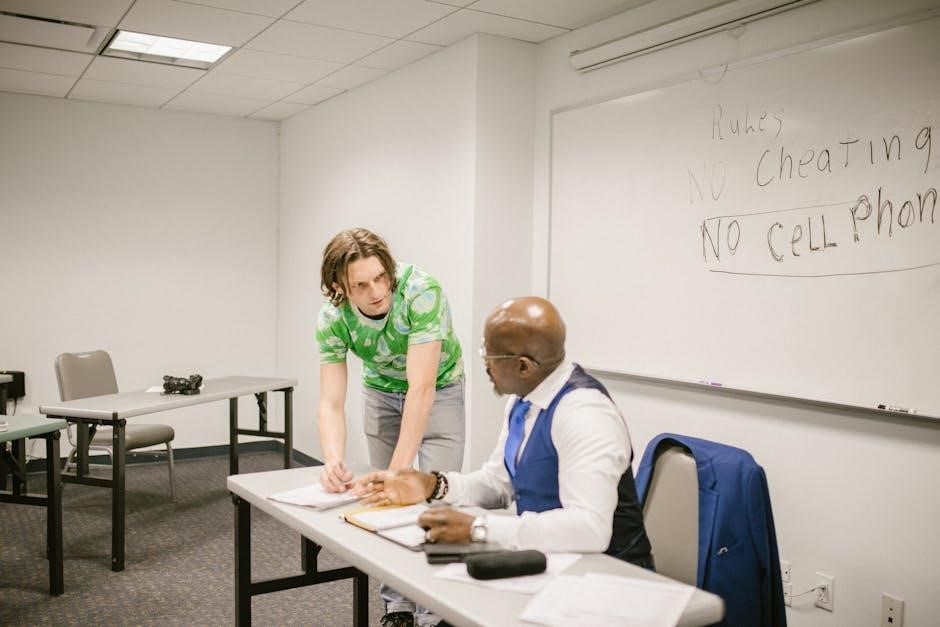Preparing for special education teacher interviews involves understanding the role’s demands and showcasing expertise in supporting diverse student needs. Effective strategies, IEP knowledge, and classroom management skills are key areas to highlight, demonstrating a commitment to fostering inclusive learning environments and student success.
1.1 Understanding the Importance of Preparation
Preparation is critical for special education teacher interviews, as it demonstrates professionalism and readiness to address diverse student needs. Researching the school’s culture, reviewing common questions, and practicing responses ensures confidence. Understanding legal standards like FERPA and IEP development is essential. Showcase your ability to create inclusive environments and manage challenging behaviors effectively. Preparation not only highlights your expertise but also assures employers of your commitment to student success and adherence to educational standards.
1.2 Key Areas of Focus in Special Education Interviews
Special education interviews emphasize understanding IEP development, classroom management strategies, and legal compliance. Employers seek candidates skilled in creating inclusive environments and addressing diverse learning needs. Highlighting experience with behavioral interventions and assistive technologies is crucial. Demonstrate knowledge of FERPA and IDEA to ensure confidentiality and legal adherence. Showcase ability to collaborate with parents and support staff, emphasizing student progress and well-rounded education. Preparation in these areas ensures a strong, confident presentation of your qualifications and teaching philosophy.

Common Special Education Teacher Interview Questions
Interviews often include questions about classroom management, IEP implementation, and strategies for diverse learners; Be prepared to discuss challenging behaviors and collaborative teaching approaches effectively.
2.1 Behavioral and Scenario-Based Questions
Behavioral and scenario-based questions assess your problem-solving skills and experience managing challenging behaviors. Examples include how you handle disruptive students or support those with emotional needs. Be ready to provide specific examples, such as using positive reinforcement or de-escalation techniques. Employers want to see your ability to think critically and implement effective strategies. Practice discussing real-life situations to demonstrate your expertise in creating a supportive and structured learning environment for students with diverse needs.
2.2 Questions About Classroom Management and Strategies
Classroom management and strategy questions focus on your ability to create a structured, supportive environment. Be prepared to discuss tools like visual schedules, positive reinforcement, and differentiated instruction. Highlight how you adapt strategies to meet diverse needs, ensuring engagement and minimizing disruptions. Emphasize your use of data-driven approaches and collaboration with support staff. Showcase your ability to balance consistency with flexibility, ensuring all students thrive in an inclusive and respectful classroom setting tailored to their unique requirements and learning styles.
2.4 Questions Related to IEP Development and Implementation
Interviewers often ask about your experience with IEP development and implementation. Be ready to discuss how you collaborate with teams to create tailored goals and ensure legal compliance. Highlight your ability to assess student needs, develop measurable objectives, and monitor progress. Emphasize communication strategies with parents and your understanding of laws like IDEA. Showcase how you adapt IEPs to meet evolving student needs and ensure effective implementation in the classroom, aligning with federal and state special education regulations.

Tips for Answering Special Education Interview Questions
Use the STAR method to structure responses, highlighting your role, actions, and outcomes. Showcase your ability to adapt strategies and demonstrate confidence in handling diverse student needs effectively.
3.1 Using the STAR Method for Structured Responses
The STAR method helps frame responses clearly: Situation, Task, Action, Result. Describe the context, your role, specific actions taken, and the outcome. This structured approach ensures clarity and highlights your problem-solving skills, making your experiences stand out. For example, discuss a challenging behavior, your intervention strategy, and the positive impact on the student. This method demonstrates your effectiveness and organizational thinking, aligning with the interviewer’s expectations.
3.2 Highlighting Relevant Experience and Skills
Emphasize your experience working with students with diverse needs, showcasing your ability to adapt strategies and implement IEPs effectively. Highlight skills like classroom management, behavioral support, and collaboration with parents and professionals. Share specific examples of successful interventions or student progress, demonstrating your expertise in creating inclusive learning environments. Tailor your responses to reflect your understanding of special education principles and your commitment to student growth, ensuring your qualifications align with the school’s goals and values.
Legal and Ethical Considerations in Special Education
Understanding FERPA, IDEA, and confidentiality is crucial. Ethical decision-making ensures student rights are protected while maintaining professional integrity in special education settings.
4.1 Understanding FERPA and Confidentiality
FERPA protects student education records, ensuring confidentiality. Teachers must safeguard sensitive information, only sharing it with authorized individuals. Understanding FERPA is critical in special education, where privacy is paramount. Confidentiality breaches can lead to legal consequences, emphasizing the need for strict adherence to privacy protocols. Being aware of FERPA guidelines helps educators maintain trust and professionalism in handling student records and personal data, fostering a secure learning environment.
4.2 Navigating Ethical Dilemmas in the Classroom
Ethical dilemmas in special education require careful consideration to ensure fair and equitable treatment of all students. Teachers must balance individual needs with classroom dynamics, maintaining professionalism and respect. Confidentiality, inclusivity, and student well-being are central to resolving these challenges. By adhering to ethical guidelines and seeking support when needed, educators can create a positive and supportive learning environment that respects diversity and promotes student success.
Resources for Special Education Teacher Interviews
Utilize recommended books, guides, and online forums to prepare for special education interviews. These resources offer practical advice and insights to help you succeed in your interview.
5.1 Recommended Books and Guides
Several books and guides are essential for preparing for special education teacher interviews. Titles like Special Education in Plain Language by Nissan offer clear insights into navigating the complexities of IEPs and classroom strategies. These resources provide practical advice on addressing challenging behaviors and fostering inclusive education. Additionally, guides specifically focused on interview preparation can help you articulate your teaching philosophy and showcase your expertise in supporting students with diverse needs effectively.
5.2 Online Forums and Communities for Support
Online forums and communities provide valuable support for special education teacher interview preparation. Platforms like Reddit’s r/SpecialEd, specialized Facebook groups, and Education Week Forums offer insights, advice, and resources. These spaces allow educators to share experiences, discuss challenges, and gain tips for acing interviews. Many communities also provide access to sample questions, success stories, and feedback from experienced professionals, creating a collaborative environment to enhance your confidence and readiness for the interview process.

Practicing for the Interview
Practicing for the interview involves reviewing common questions, refining responses, and rehearsing delivery to build confidence and ensure readiness for the discussion.
6.1 The Role of Mock Interviews
Mock interviews simulate real interview scenarios, helping candidates practice responding to special education-specific questions. They allow for refinement of answers, feedback from educators or mentors, and improved confidence. By recreating the interview setting, mock interviews enable candidates to articulate their teaching philosophies, classroom strategies, and experiences more clearly. This practice also helps in identifying areas for improvement, ensuring candidates are well-prepared to address challenging behaviors, IEP implementation, and other critical topics effectively during the actual interview.
6.2 Self-Recording and Feedback Analysis
Self-recording interviews allows candidates to review their performance, identifying strengths and areas for improvement. By analyzing verbal cues, body language, and clarity of responses, individuals can refine their communication skills. Feedback from mentors or peers provides additional insights, helping to polish answers and build confidence. This reflective process ensures candidates present their qualifications and teaching philosophies more effectively, making a stronger impression during actual interviews.

Common Mistakes to Avoid in Special Education Interviews
Overlooking parental involvement and failing to discuss challenging behaviors are common pitfalls. Ensure you emphasize collaboration and preparedness to demonstrate your readiness for the role.
7.1 Overlooking the Importance of Parental Involvement
Parental involvement is crucial in special education, as it ensures a collaborative approach to student support. Ignoring this aspect can hinder progress and create communication gaps. Effective teachers actively engage parents through regular updates, involving them in IEP development, and fostering trust. Strategies like parent-teacher conferences and accessible communication channels are essential. Overlooking parental roles can lead to missed opportunities for student growth. Always emphasize collaboration and openness to demonstrate your commitment to a team-based approach in education.
7.2 Not Being Prepared to Discuss Challenging Behaviors
Failing to address challenging behaviors in interviews can signal lack of preparedness. Discussing proactive strategies, such as positive reinforcement and de-escalation techniques, is vital. Be ready to provide specific examples of how you’ve managed difficult situations, emphasizing collaboration with support staff and parents. Avoid vague responses; instead, highlight your ability to adapt strategies to individual needs. Demonstrating confidence in behavior management showcases your readiness to support diverse learners effectively in a special education setting.
Emerging Trends in Special Education
Emerging trends include personalized learning, technology integration, and inclusive practices. These innovations aim to enhance accessibility and engagement, ensuring tailored support for diverse learners and improved outcomes.
8.1 The Impact of Technology on Special Education
Technology has revolutionized special education by providing adaptive tools and personalized learning experiences. Assistive devices, educational software, and online resources enable tailored instruction, enhancing engagement and accessibility. AI-powered platforms can help with individualized learning plans and behavior tracking. However, privacy concerns and equitable access remain challenges. Teachers must stay informed about emerging tools to leverage technology effectively, ensuring it complements traditional methods and supports diverse student needs while addressing ethical considerations.
8.2 The Growing Importance of Inclusive Education
Inclusive education emphasizes creating learning environments where all students, regardless of abilities, participate equally. This approach fosters diversity, equity, and social inclusion, benefiting both students with special needs and their peers. Teachers play a crucial role in implementing inclusive strategies, such as differentiated instruction and collaborative learning. As awareness grows, schools are increasingly adopting inclusive practices to ensure every student accesses meaningful education, promoting academic and social growth while addressing individualized needs effectively.
Conclude by expressing confidence in your abilities and passion for special education. Follow up with a thank-you note and stay informed about best practices to excel in interviews.
9.1 Staying Confident and Positive
Staying confident and positive is crucial during special education interviews. Highlighting your passion for inclusive education and showcasing your ability to adapt to diverse student needs can make a strong impression. Emphasize your commitment to creating a supportive learning environment and share specific examples of successful strategies you’ve implemented. Demonstrating enthusiasm and resilience will illustrate your readiness to thrive in this rewarding field.
9.2 Following Up After the Interview
A follow-up after the interview is essential to leave a lasting impression. Send a thank-you note within 24 hours, expressing gratitude for the opportunity and reiterating your enthusiasm for the role. Highlight how your skills align with the school’s needs, referencing specific topics discussed, such as IEP development or classroom strategies. This demonstrates professionalism and keeps you fresh in the interviewer’s mind. If appropriate, offer to provide additional information, like sample lesson plans or references, to further support your candidacy.
